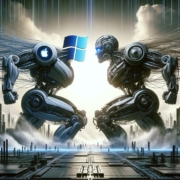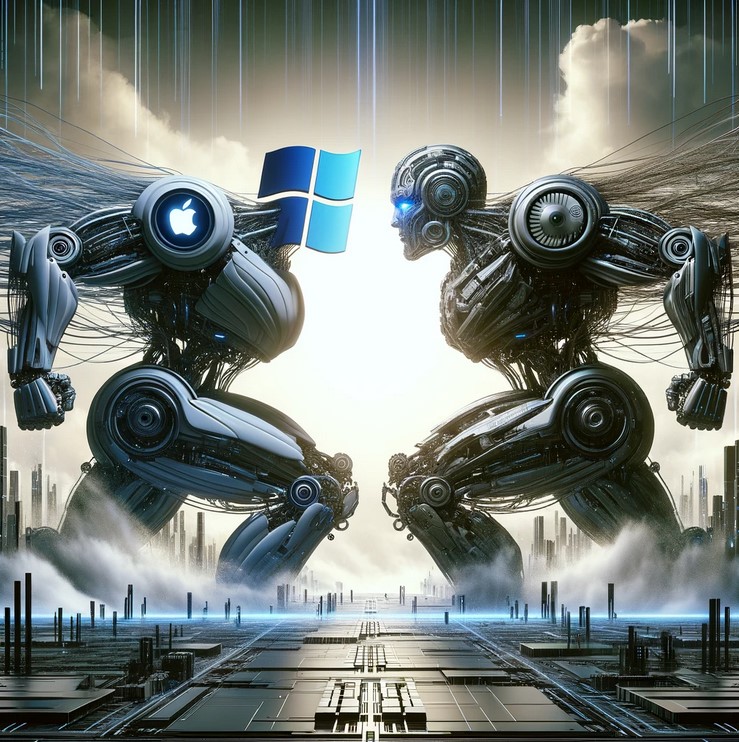AI ARMS RACE
(MSFT), (AAPL), (GOOGL), (DELL), (LNVGY)
In the high-octane world of tech titans, where the battle for supremacy unfolds with more gripping tension than the season finale of your favorite thriller, it's Microsoft (MSFT) and Apple (AAPL) that now find themselves at the epicenter.
As we stepped into January 2024, their battle for dominance has become the stuff of legends. Microsoft, with its towering $2.7 trillion market cap, is breathing down the neck of Apple's $2.8 trillion throne – the closest they've been since the autumn days of November 2021.
This isn't just a numbers game; it's a clear sign that the winds in the tech world are shifting, and fast.
These behemoths, part of the elite club known as the "Magnificent Seven," don’t just move the market – they are the market. But even Titans can have off days.
The first week of 2024 wasn’t exactly a walk in the park for Apple, grappling with a series of Wall Street downgrades. It seems their iPhone, once the crown jewel, is now showing signs of losing its sparkle amid softening sales.
And let's not forget Apple's dance with China – a double-edged sword that brings both opportunities and headaches, thanks to the ongoing U.S.-China tensions and China's unpredictable economy.
Meanwhile, Microsoft is carving out its own narrative, and it’s one that’s AI-centric.
By embracing ChatGPT and backing OpenAI, Microsoft is betting big on AI – and it's a bet that's starting to look like a masterstroke.
In fact, the year 2024 is shaping up to be a banner year for them, thanks in no small part to this AI-driven strategy.
The cloud computing arena, where Microsoft is elbowing its way against the likes of Google (GOOGL), is ballooning at an astonishing rate.
From $546.1 billion in 2022 to a projected $2.3 trillion by 2032 – that’s not just growth; it’s practically an economic explosion. And Microsoft, with its AI prowess, is poised to stake a significant claim.
But let's cut through the hype for a moment. Microsoft's AI journey isn’t a smooth sail – it's a trek through uncharted waters.
The company's use of AI has already landed them in legal hot water, with The New York Times raising the flag over alleged content misuse. Yet, despite these choppy waters, Wall Street's optimism hasn’t waned. Companies like Microsoft seem to have the grit to navigate these challenges, possibly through strategies like data licensing agreements.
The AI commitment from Microsoft is crystal clear, especially with the buzz around Sam Altman's rumored transition from OpenAI to Microsoft. It’s a move that signals their resolve to not just participate in the AI revolution but to lead it.
Enter the AI key on Microsoft’s keyboards – a nod to the future that’s as bold as it was when they introduced the Windows key back in 1994. This isn’t just a new button; it’s a gateway to Microsoft's Copilot AI software on PCs running Windows 11.
Forget the memories of Clippy; this is a whole new ballgame. The 365 Copilot, tagged at $30 per user a month, is already turning heads in its early corporate trials, promising to redefine productivity.
By 2026, this suite could be looking at $9.1 billion in incremental revenue. Based on Microsoft’s plans, Copilot is set to become an indispensable AI companion, both in the office and beyond.
For context, the productivity apps market is on a trajectory to jump from $9.42 billion in 2022 to a whopping $15.97 billion by 2028.
The AI key might seem small, but it’s a giant leap in tech evolution. We’re talking about companies like Dell Technologies (DELL) and Lenovo Group (LNVGY) racing to launch PCs that can run generative AI applications independently, no internet needed.
Microsoft’s vision of an OS that blends local and cloud processing is taking shape, and these AI-powered keyboards are expected to be the showstoppers with various Windows 11 PCs, including the Surface line, hitting the shelves starting in late February.
Over at Apple, CEO Tim Cook is acutely aware of the AI wave. Yet, he’s playing his cards close to the vest. With Microsoft’s relentless push into AI, Apple needs to reveal its hand soon if it wants to stay ahead in this relentless tech race.




